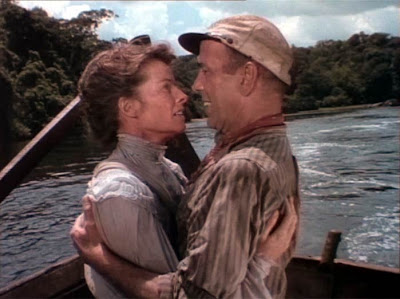
If you have ever loved mid-life romances in film, like The Bridges of Madison County, you might have to thank a film like The African Queen, John Huston's wonderful adaptation of C.S. Forester's classic novel. Two of Hollywood's finest and most legendary stars, Katherine Hepburn and Humphrey Bogart, are teamed up for the first.... and alas, the last time of their careers, and it is a shining moment for the fans of either of these great actors.
The African Queen begins with Rose, played by Hepburn and her brother, played chillingly by Robert Morley, as Methodist missionaries serving a native village in East Africa dominated by the Germans at the beginning of the First World War. While conditions are grim, the two seem to have found their place in life until the German army shows up to forcibly enlist the villagers and burn the village. Robert Morley makes a quick but memorable exit as he proceeds to have a nervous breakdown and dies. Virginal and innocent Hepburn is left to face the unknown dangers of the dark continent.
At this time, Bogart appears, a broken down riverboat captain with an even more broken down riverboat named The African Queen. He is named Charley and is the lifeline for Rose and her brother to the outside world. Now he represents her only hope of escape....and also revenge against the German Army. Charley tells her that the British would have a much easier time of invading East Africa if the Battleship Steamer Louisa in Lake Tanganyika at the mouth of the river could be removed. Charley reluctantly agrees to Rose's plan of shooting the rapids of the river, avoiding a German fort on the same river, and arming The African Queen with homemade torpedoes to d estroy the German Steamer.
estroy the German Steamer.
As they travel down river and face ever more serious peril, these two strong minded people begin to develop first respect for one another and then a very unlikely romance begins to spring up. No less a barrier than class distinctions is overcome, she an English blue-blood missionary and he a Canadian of a disreputable background and of course their differing moralistic outlooks. Perhaps the nadir of their relationship, if not the most hilarious is when Rose dumps Charley's supply of Gin overboard after the drunken captain refuses to go through with their plan. This is also a watershed moment of their relationship as Charley begins to realize his need for her acceptance and Rose understanding the depth of his courage and integrity.
And soon, these two lovable losers begin to find love for one another...almost desperately as each intuitively realizes this is their last shot at love. A sweet September-September romance blossoms between them that is bewitching and compelling to watch, particularly Rose who is discovering a sense of her own sexual awareness and desire. Hepburn is magnificent at this with her longing, yet trembling glances at Bogart. For Bogart's part, he too is never better....breaking out of his cool, world weary mercenary, to deliver a character who is unsure of himself, lonely, and perhaps questioning the choices he has made. Each of these flawed people cling to each other in desperation and become greater human beings for the experience.
Huston is at the apex and maturity of his direction, wringing the most grand performances from his actors and from the rich, colorful cinematography of filming on location. While on location, the entire cast and crew struggled mightily with conditions on the river, sickness, and encounters with dangerous wild life to produce a grand yet intimate epic of adventure and romance. Who says forty or fifty something folks can't be sexy....Hepburn and Bogart are almost magically sexy here!
TH Reviews rating: 5 stars out of 5...highly recommended!











